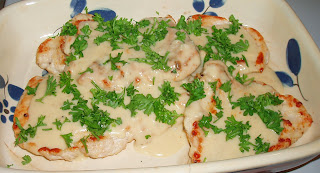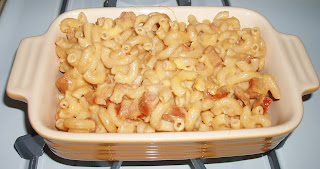But I’ve decided that’s just as well because one of my problems in the past with learning/not learning how to cook is I was all gung ho about it in the beginning, bought a bunch of ingredients and made a bunch of stuff, some of which turned out, some of which didn’t. And after that first week, I’d completely lose interest in doing it again and back to Costco I’d go for the already-roasted rotisserie chicken for $4.99. This time, I’m trying to make it different. Like dieting or saving for a big financial goal, you have to keep at it if you want results. Consistency is best. It’s easy to take off a few pounds when you’re sick of sugar and feeling fat from holiday eating. But it’s taking it off and keeping it off in the long run that really matters and that only comes about with consistency and perseverance. Same thing with cooking or any other meaningful goal you want to achieve. It’s probably better for me to cook every other day and do it over the long haul instead of loading up the first couple of weeks and losing interest in it all over again once I burned out sufficiently from it.
Before I start on tonight’s cooking experiment, an update on the mac and cheese and the chicken piccata I’d made already. Had the mac and cheese for breakfast this morning – yeah, it’s a weird breakfast but I’ve also been known to eat breakfast food for dinner so I see nothing wrong with dinner food for breakfast. I’m an equal opportunity, doesn’t-matter-what-time-of-day eater. Even aside from the fact that I didn’t have egg beaters on hand and couldn’t fry my usual faux scrambled eggs for breakfast. Besides, I had a lot of the mac and cheese leftovers since I’d made the dish twice so I have to eat it sometime. You definitely don’t want to reheat this too much. Since I had the leftovers portioned out in individual-sized portions in the freezer, I had to heat it up. It got a bit rubbery as I heated it too long. So go easy on the reheating. I think this dish tastes best when eaten immediately after cooking and isn’t ideal as a make-enough-to-have-leftovers kind of dish.
The Chicken Piccata on the other hand was just as good as when I first made it. I’m really pleased with this recipe and how it turned out. Normally when something has a sauce to it, I love to eat it with rice (hey, after all, I’m Asian). But in trying to eat better, I actually had today’s portion on a bed of salad greens. I heated up the chicken piccata first then dumped it over the salad greens. I never eat salad with dressing but the lemon sauce made a perfect “dressing” for the salad. Good stuff. This recipe alone was worth getting the cookbook.
Now onto the Fettuccine Alfredo. This is also from the Most Decadent Diet Ever by Devin Alexander – can you tell once I glom onto a cookbook, I try as many recipes from it as possible? In this case it’s partly because there seem to be a lot of good recipes that are to my taste and my skill level in cooking. And partly because I have over 200 cookbooks and all but 4 or 5 of them are baking books, not cooking books, so I don’t have a big pool to choose from if I want to make “real food”. The original name for this recipe is actually Fettu-skinny Alfredo because it’s supposed to be made with lowfat Parmesan cheese and nonfat half-and-half. I had the nonfat half-and-half but they didn’t have reduced-fat Parmesan cheese at Trader Joe’s so I went with the regular version even if it meant it’s not as low-cal, low-fat as the recipe intended. I also bought the Parmesan cheese already shredded. Yeah, how lazy am I? But grating cheese is a pain and there’s not that much of a price difference between the block of Parmesan and the grated fresh Parmesan in a bag, at least not in the amounts I needed. The extra buck is worth my time. I added chicken breast chunks to the dish for the added protein. Plus I got to use my new meat mallet again and whacked the chicken breasts into tender thinness again so that was fun. Anything to liven up a Monday night.
How it turned out:
So even though it wasn’t with the low-fat Parmesan cheese, I’m hoping that didn’t alter the intended flavor or calorie count by that much. If it did, then I’m glad I worked out this morning. The sauce was good although next time I would do two things differently with this recipe. One, I would use angel hair pasta instead of fettuccine noodles. Much as I like fettuccine alfredo in general, I don't like big noodles. They're too heavy and you're busy eating so much noodle that sometimes the taste of the sauce gets lost. I think this would be much better with angel hair pasta or spaghettini noodles. Second, I would stop garnishing with parsley. It was optional and I didn't have to but since I had a bunch of parsley (literally, 1 bunch) that I bought for the other recipes, it seemed a shame not to use them. But after I tried it, I decided the recipe stands on its own and doesn't need the parsley. Otherwise, if you like pasta with alfredo sauce, this is definitely a good alternative to the calorie-laden versions.

Fettu-Skinny Alfredo - made January 4, 2010, from The Most Decadent Diet Ever by Devin Alexander
9 ounces dried fettucine
2 ½ teaspoons unbleached all-purpose flour
1 cup plus 2 tablespoons fat-free half-and-half
½ cup plus 2 tablespoons grated reduced-fat Parmesan, divided
½ teaspoon garlic powder, or more to taste
1/8 teaspoon salt, or to taste
3 tablespoons light butter (stick, not tub)
Chopped fresh parsley, optional
1. Cook fettuccine according to package directions.
2. Mix the flour with just enough half-and-half to form a paste in a medium bowl. Slowly add the remaining half-and-half, stirring to remove any lumps.
3. Place a medium nonstick skillet over medium heat. Put in the half-and-half mixture, ½ cup Parmesan, the garlic powder and salt to taste. Cook, stirring constantly, until the mixture is as thick as gravy, 5 to 7 minutes. Stir in the butter until it melts and is well incorporated. Toss in the cooked fettuccine. If the sauce still needs to thicken slightly, continue to toss the fettuccine until the sauce thickens. Divide the fettuccine among 4 pasta bowls or dinner plates. Top each with 1 ½ teaspoons of the remaining Parmesan and a sprinkling of parsley, if desired. Serve immediately.
Serves 4








